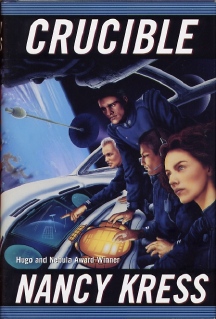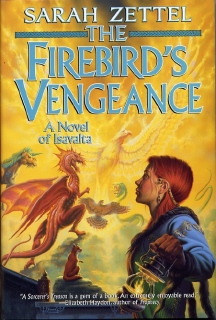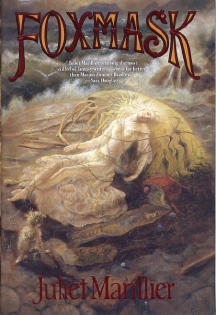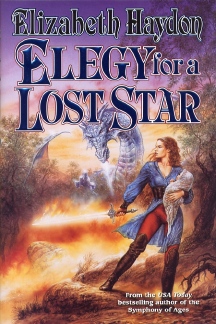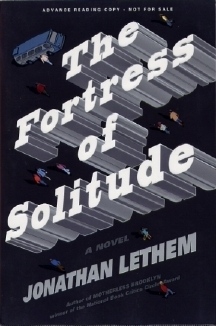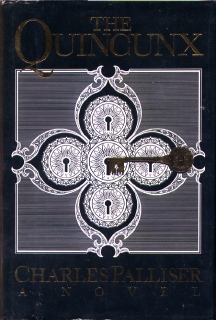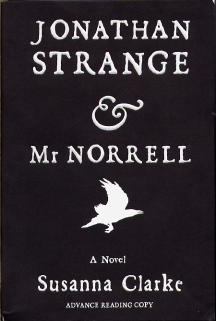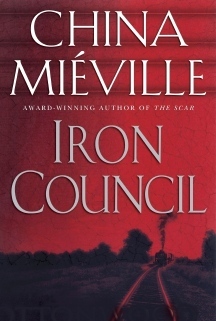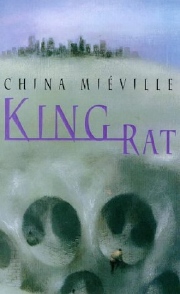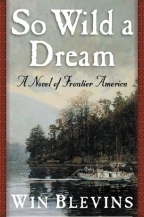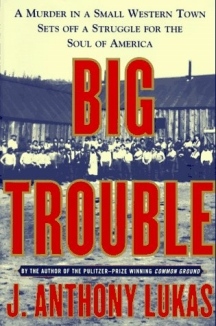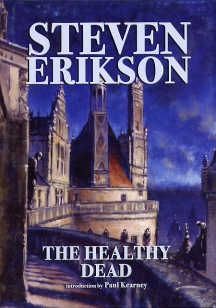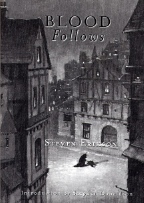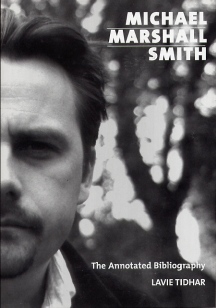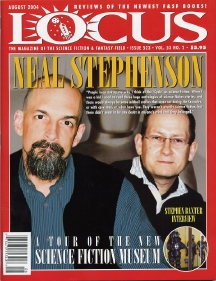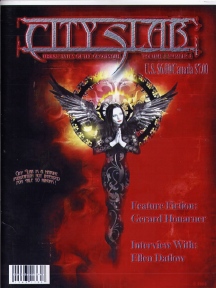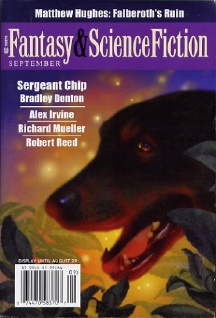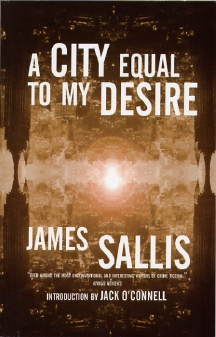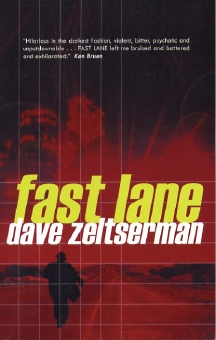|
|
|
This Just in..News from the Agony Column
|
08-06-04: With All this Fantasy Who Needs the Real World? |
|||||||||||||
Tor
Unleashes Unreality By the Boatload
Back when that question was asked of me, in the late 1960's and early 1970's, fantasy was pretty hard to find, though I must say, I did a good job of it. I obsessively collected and arranged rows of Edgar Rice Burroughs paperbacks. I loved the cover art, and my fifth-grade friends and I would tell one another (and unwisely, our parents) that we were Red Martians. I bought the at-that-time quite unusual boxed set of paperback books for both 'The Lord of the Rings' and 'Gormenghast'. (I can no longer extract the Gormenghast books from the box.) I'd go to a Lucky Grocery Store near this thing called a "mall", the Eastland "mall" in West Covina. They had an entire wall dedicated to paperbacks. There I found the Ballantine "Adult Fantasy" line, edited by Lin Carter. Halcyon days, those were. I still have my paperback copy of Clark Ashton Smith's 'Poseidonis', Lord Dunsany's 'At the World's Edge', H. P. Lovecraft's 'The Fungi From Yuggoth' and 'The Doom that Came to Sarnath'. There I bought the Michael Moorcock Elric of Melniboné series. The tales of the vampiric, life-sucking sword and its weakling master, who was energized by the lives the sword stole were balm to an adolescent soul. It took a bit of looking though, and little of what I found was less than twenty years old. It wasn't easy to find fantasy back then. Fast forward to the future, 2004, three years after the date of Arthur C. Clarke's epochal novel and Kubrick' brain-searing film vision. The world looks and feels little different from the times in which the visions were brought to life. But in the graveyard of our expectations for the future, fantasy runs rampant. Publishers have gattling guns pumping out titles to help adolescents everywhere -- now fully grown, holding down a forty-plus hours per week jobs and coping with terror alerts that obviate the entire horror genre. Who needs the real world? Surely not me! Let's start the unreal world off right, with some star-spanning science fiction from one of our now-acknowledged masters, Nancy Kress. I'm probably not the only person who finds the CGI-cover art somehow disturbing. But I'm certainly not the only person who can quickly get past the cover art and into the complex story that Kress began in 'Crossfire'. The crossfire in question involves not fire-breathing talking heads but rather two alien species at war in the cosmos. Human settlers have stumbled between the Furs, aggressive, militaristic humanoids and the Vines, passive, plantlike creatures. In a choice that seems more on the fantasy side of the equation than the science fiction side of the equation, humanity sides with the Vines. In the follow-up, 'Crucible', our plantlike friends come up with a Final Solution for the Furs. It's a virus that will remove all aggressiveness from a species noted for aggression. I can't say this sounds like the soundest preparation, but one is tasked to remember that it's plants doing the planning. We suspect that they may have an ulterior motive. Of course all this wartime plotting and planning by plants may be a little too close to home for readers who are trying to escape the real world.
So we thank Tor for their latest set of fantasies. Especially since they bring some talented authors to the table. For example, look at Sarah Zettel. She's won the Locus Award for Best First SF Novel in 1996. She was a runner-up for the Philip K. Dick Award in 1997. Readers know that the PKD awards are highly prized here at The Agony Column. They're an indicator of imagination and daring. In 2002, Zettel started a fantasy trilogy with thenovel 'A Sorceror's Treason'. She followed that book the state-mandated one year later with 'The Usurper's Crown'. This being 2004, it takes no rocket scientist to predict that the trilogy-completing title has arrived. (That's good because in this alternate history of the post-2001 world, rocket scientists who aren't book till the third millennium creating new surface-to-air missiles are in short supply.) That would be 'The Fierebird's Vengeance', and damn if they don't get every standard-issue fantasy critter on the cover of that book. You got your dragon, unicorn, eagle, phoenix and a fox. What more could you ask for? Trilogy completed? Check. A dangerous game of power and politics? Check. Magical powers "she can't control"? Check. Filter all this through the mind of PKD-award winning writer, drop it into a nicely-designed hardcover book, and serve it up on a commuter train humming between the Golden Gate and the golden hills.
Juliet Marillier hews closer to historical reality in the sequel to
her novel 'Wolfskin'. This is an under-appreciated aspect of fantasy.
Much
of it takes its cue from historical fiction, with supernatural and magical
aspects absent or toned down. That's the case with Marillier's latest
work. 'Wolfskin' introduced Eyvind, a young boy who wants to become a
warrior
in the Norse society. With his best friend Somerled, he sets sail with
a band of warriors, landing on the coast of the Orkney Islands. He finds
love with a local seer, but Somerled sets in motion plans that Eyvind
must oppose, and Eyvind is eventually forced to banish his longtime friend. |
|
08-05-04: This Year's Big Book, Points of Order |
||||||||||||
Jonathan
Strange & Mr Norrell by Susanna Clarke
There's a process of immersion that goes on for the reader. When you read a long book, you remain in the places the author has created, you listen to the conversations of the characters and get to know them. You see sunset and sunrise, oil on the streets, wisps of fog lit by streetlights. The places and people of the book become real to the reader in a way that real places and people cannot. One of my favorite Big Books is Charles Palliser's 'The Quincunx'. In this 1989 novel, Palliser creates thrills, depths and textures so real you'll feel that you've been transported back to the Victorian times it portrays. It's the story of John Huffam, a young man from the North of England who slowly unravels a complex legal and family history as he tries to take his place in the world.
On Tuesday, I got an Advance Reading Copy of a book I can sense will be this year's Big Book. 'Jonathan Strange & Mr Norrell' (Bloomsbury; September 8, 2004; 800 pages; $27.95) by Susanna Clarke looks to have all the heft of Palliser's wonderful novel, a similar setting -- England, 1806 -- with magic. And not just the magic of words, of a world created in prose. In 'Jonathan Strange & Mr Norrell', England re-discovers magic when the rich and creative Mr. Norrell makes his talents known to the world. He brings statues to life and summons ghost ships to terrorize Napoleon's galleons. Norrell is right and proper with his magic; "He hardly ever spoke of magic and when he did it was like a history lesson and no one could bear to listen to him." Norrell soon finds he has a counterpart in Jonathan Strange, a handsome, charming and talkative rival. Strange becomes Norrell's pupil, but it's clear that he's the opposite of Norrell. He's attracted to magic at its wildest, magic in its most dangerous forms. Strange is fascinated by the mythical figure of the Raven King, a child taken by fairies who became king of both England and Faerie. His pursuit of the Raven King and magic itself becomes hazardous to his health and the health of those around him.
Clarke spent ten years, yes ten years writing this novel. Her time is being rewarded with a huge publicity campaign that's already begun. Soon you won't be able to escape this novel, so my suggestion is to queue it up now, to get your bookseller to line up a first edition for you. Hopefully, Clarke won't take ten years on the sequel. She's already well into it, we're told, and it will take up a bit after this one leaves off. While you're getting your bookseller to reserve you a copy of a first printing, make sure you get copies of both versions. The novel will be released with two covers, black on white and white on back. I'm told that white on black will be the default after the first printing sells out, so you'll want black on white. I'm getting my copy soon, and I'll post a cover when I do. In the interim, I'm going to have to establish some new rules that ensure I have enough time to read and enjoy this fine novel. I'm moving in. I hope it has room for bookshelves. |
||||||||||||
Readers Respond to 'Iron Council'
For the record then, let me answer Troy's question about reading order. It's an important question. Troy wrote to ask me: "Do you have to read 'Perdido Street Station'and/or 'The Scar' before reading 'Iron Council'?" According the China, the answer is "No". They are meant as stand-alone novels. Each can function without the other and there's very little crossover between the three. This is not to say that there is no cross-over, but it's minimal and very much in the background. In fact, it's so much in the background, I would say, go right ahead and read 'Iron Council' first. It will give you a great idea of what Miéville is all about. Now I will confess to having given 'Perdido Street Station' to one of my reading buddies who bounced off the novel about halfway through. At the time, she told me that she found the casual monsters -- that is monsters that are surreal and even by common standards well, disgusting, but most assuredly not EVIL -- kind of off-putting. (And she's not a super girly-girl reader. She reads some pretty outré works, but then, she prefers Patricia McKillip.)
That said, it is always, always better to read books in the chronological order of creation. Some people will dispute that, but to me it's a pretty iron-clad rule. If you think you might not like 'Perdido Street Station', 'The Scar' or even 'Iron Council', you can always start at the beginning, with Miéville's first novel, 'King Rat'. Though it's not a novel of Bas Lag or New Crobuzon, it does amply display Miéville's prose skills. If you enjoy that novel, and you think you might like a fantasy set in a city much like the London of 'King Rat', then move on to 'Perdido Street Station', and from there to 'The Scar', and from there to 'Iron Council'. Rest assured, they're some of the best speculative fiction you can possibly find. The short answer to Troy's question, then, is "You don't have to read them in order but if you enjoy one you'll likely enjoy them all." I know, there's never a single short answer. And I'm not one bit sorry about that.
"In Rick Kleffel's review of Iron Council by China Mieville, I was a bit puzzled by the phrase, the 'pure socialism of the Old West'. I've never really associated the Old West with Socialism. Please explain?" That damn Kleffel is always shooting off his mouth without thinking. Sort of. Actually, China and I talked a bit about this in the interview, but for the purposes of the review, my thoughts go like this. In 'Iron Council', Miéville shows us true pioneers, striding into unknown country, taking their civilization with them. And as in the Old West of our past, it's pretty much a socialist society that gets built -- to each according to their needs and from each according to their skills. This applies mostly to the true frontier. For a good picture of this, you can check out Win Blevins' 'So Wild a Dream'. It's a great frontier novel and beautifully written. But the West was host to another kind of Socialism as well, the kind that was born in the mining communities and killed in the cities around the time of Eugene Debs. One of the most powerful books you can read on this subject -- absolutely gripping -- is 'Big Trouble' by J. Anthony Lukas. I've talked about this book in a couple of columns; one on fear, in this case, fiscal fear, and in another on socialism.
Miéville's frontier socialists are pilgrim outcasts, not downtrodden miners, but the sentiments are not that far apart. I recommend 'Big Trouble' as an excellent reading companion to 'Iron Council'. It's easy to forget the rich history of America. It's not all little guys who made it big as bezillionaire entrepreneurs on the backs of willing-to-work wage-slaves. There's a lot more there than you'll see on TV. That's why we read books, and even better -- like my two readers who wrote -- ask questions of those who pontificate about them. Consider my cover blown. I've been tumbled. To quote Howard Waldrop -- "Workers of the World! -- Sorry..." |
|
08-04-04: PS Publishing and the Box o' Books, Part 1 |
|||||||||
Steven
Erikson and Michael Marshall Smith
PS started out as a specialty shop run by the esteemed Peter Crowther. Crowther decided that the world needed novellas, and sought to publish a series of novellas that's really given the format a huge boost and cemented the careers of more than a few writers. I would have been happy to see Crowther just stick with the novella format, but he started branching out with a 'The Dark of the Woods', a Ramsey Campbell novel and the 'Infinity Plus' anthologies. He's since expanded his range significantly, publishing more novels, anthologies and collections of non-fiction. The first issue of his magazine 'Postscripts' is out with a selection of authors that could only be called stellar. Crowther has definitely made the step from specialty press to full-blown publisher. Probably the most anticipated title from PS Publishing has to my mind been 'The Healthy Dead' by Steven Erikson. His first novella for PS, 'Blood Follows', was a wonderful Miéville-esque fantasy with lots of humor in the mix. Though 'Blood Follows' was set in the world of the Malazan Empire, it's independent of the novels. Erikson creates a new set of characters and a new town for them to live in called Quaint. If you're wondering whether or not you should read Erikson's more forbiddingly long series, this novella is a great introduction. I suspect most readers will be ordering the novels before finishing the novella. The first edition rapidly sold out, both in the paperback and the hardcover versions. When PS announced a follow-up over a year ago, there was a lot of anticipation. Today that anticipation pays off -- twice.
What's so nice about these books is that they use elements of crime caper novels, fantasy novels and character-driven humor to create a unique and highly entertaining story. They're filled with imaginative touches. The magic and the other races that inhabit the world seem utterly real. Erikson really has a way of evoking a huge world just beyond the perceptions of the reader, which isn’t surprising. He's got five seven to nine hundred page novels out there set in this world. In case you're wondering, these should be on your auto-buy list.
What makes it really worthwhile, and not just to the MMS reader, but also to the would-be writer, are Smith's comments on his own work, sprinkled throughout the bibliography. As you might expect, they are at turns funny, wry, pointed and helpful. He talks about how 'Spares' had to be "hacked out of the word mines syllable by syllable". It's inspiring stuff if you're a writer and intriguing stuff if you're a reader. In all senses, this bibliography offers material that's much more than a catalogue. Tidhar is on the verge of breaking out, it seems, with scheduled appearances in anthologies and magazines. He's a reviewer for DuskSite.com. I just took a look at this website, and readers of The Agony Column will want to give it a go. They cover some of the same territory you'll find covered here, and some different territory as well. It's well done, professional and the content is, well -- as ever content is king! |
|
08-03-04: The Periodic Periodical Page |
|||||||||
Locus
August 2004, City Slab Number 4, The Magazine of Fantasy and Science
Fiction September 2004
First to arrive and alas, last to be opened was Locus. Now, don't take my tardiness in getting it out of the first-class envelope as a sign about my feelings towards the magazine. They always hover between deadly envy and terrifying dread. I love what Locus does, and it does it on a scale that seems pretty phenomenal. This month's issue is a good example. Neal Stephenson, who wouldn't talk to anyone beyond Newsweek about his novels, offers one of the Locus-style essay/interviews in this issue, and it is damn good. Notice the new hairstyle? It's because he finally finished his Baroque Cycle. In the interview he talks extensively about the Baroque Cycle and mentions that he's annotating the novels at metaweb.com. What he's doing is nothing less than telling readers which characters in these huge, complex historical novels are real and which are created. I happen to be one of those who'd like to know such information. Call me compulsive, but you won't get any extra-credit for it. Readers have seen my bookshelves and know that compulsive is only the start of the equation. Elsewhere in the magazine, Stephen Baxter is interviewed, again the Locus-style essay-interview. For those unfamiliar with this format let me explain. You get the author's words, entirely in quotes, with no questions from the interviewer. Presumably, this type of interview is done via email. It's an interesting call to edit them in this fashion, if that is indeed what is done. There is the potential for certain readers to be distracted by the style, though it doesn't bother me. Baxter talks about his 'Destiny's Children' series, which started with 'Coalescent'. He's turned in the second book ('Exultant') and he's on the third one ('Transcendent') right now. These books are set in his "Xeelee universe", and meant to tell the history of the war that we've seen the beginning and end of in his various novels. I read and enjoyed a Xeelee novella from PS Publishing titled 'Riding the Rock', and suspect the rest of the series might be of interest as well. He also talks about collaborating with a very active Arthur C. Clarke, which is great to hear. I'm one of millions who started out reading Clarke's SF in the sunny 1960's. Who'd have thought we'd get past 2001 and have it look so different from Clarke's novel?
Authors include Gerard Houarner, PD Cacek (whose 'Night Prayers', a vampire novel) was nominated for a Bram Stoker award, Angela Horlick, Patricia Russo, Robert Dunbar, and Brandon Alspaugh. I read 'Three' by Angela Horlick and found it to be a well-written and enjoyable tale of urban terror. Horlick takes a risk writing the entire story in the second person ("You aren't stupid. And you know how to use the computer for more than email."). It's odd but effective for the story; or at least it certainly does not derail the story. I haven't read the other stories yet, but if they keep up this level of quality, they're certainly setting a nice standard. Elsewhere, Lindschmidt interviews Ellen Datlow and does a very credible job talking to one of the luminaries of the genre fiction world. Alas, he does repeat an entire question and answer in the body of the interview, so all the kinks are not yet worked out of the process of getting the words between the covers. On the other hand, one must mention the kinks that deliberately get between the covers. Those would be the cheesecake-style black and white photos of Dominatrix/Professional Sadist Lydia Maclane, who gets one full-color centerfold. Model Morrigan-Hel gets an interview as well as some photos. Suffice it to say that if you like your urban horror fiction interleaved with some nearly tasteful nudes, 'City Slab' is your best bet. But don't leave it out for the kids to leaf through.
Or what is usually an unrecognizable future. However, this future is all-too recognizable as the present, that is, with all our fine Patriot Acts and terrorism laws having given birth to a monstrous version of America. While I don't think it's impossible, I wished the story had done a bit more than move in a straight line. The prose is nice, but to my reading the characters were underdeveloped, brought only to the point where they'd support the premise of the story. But I've got to admit it grabbed me and I finished it. Elsewhere, Charles De Lint does books, this time around Joe R. Lansdale and Kim Wilkins. I've really got to get on Kim Wilkins myself, having been sent her way by Andy Fairclough of Horror World. Michelle West reviews the latest Sean Williams novel, 'Perfect Circle'. I've heard lots of good things about this novel and West confirms them. Robert Reed, Richard Mueller, Matthew Hughes, J. Annie Macleod and USENET regular Mark Tiedemann all contribute short stories. Once again, a nice little collection in a decent package. Damn it! I hate it when my prejudices against digest-sized magazines are proved wrong. I've even got every damn issue I was supposed to get. And like the good compulsive book-buyer I am, I'm tempted to keep every issue. Where am I going to put them? I guess I need to subscribe to Analog: Science Fiction, Science Fact to get the schematics for that Personal Universe thing they're always talking about. All I've got to figure out is if it comes with bookshelves. |
|
08-02-04: One Hard Luck Story After Another |
|||||||||
Beyond Six Degrees With Point Blank Press, James Sallis and Dave Zeltserman
Readers are already familiar with James Sallis, via Terry D'Auray's review of his 1991 title 'The Long Legged Fly'. Sallis is an author with a long and impressive resume, lots of great titles to his name whose profile is clearly not as high as it deserves to be. Perhaps that's in part because he doesn't just stick to a formula. He doesn't just crank one novel per annum, advancing his serial character one notch and retreating him another. Sallis' penchant for experimentation is clearly portrayed in his Point Blank debut, 'A City Equal to My Desire' (September 2004, Point Blank Press, $29.95 Trade hardcover). This collection of twenty three almost irresistibly readable short and short-short stories is so full of variety that it's bound to confusigate anybody looking for one-stop cop shopping. Sallis writes in a variety of styles. You have whimsical tales like 'The Monster At Mid-Life' and hard-boiled tales like 'Ukelele and the World's Pain'. Sprinkled in among the short-shorts are a few short stories. The selection hails from a wonderful variety of sources, from VanderMeer and Forrest Aguirre's Leviathan 3 to 3 AM Magazine, from Dennis Macmillan's 'Measures of Poison' to the Fantastic Metropolis website. This should give our readers some idea of what to expect -- that is expect to be surprised! But once you read the first selection, one thing won't surprise you -- the high quality of the writing on display here. Sallis is a true original, and he deserves to be read by fans of speculative fiction as much as by fans of mystery fiction. Readers in the market for a powerful collection of unpredictable short fiction should start lining up now. Equally intriguing is the first novel by editor Dave Zeltserman, 'Fast Lane' (September 2004, Point Blank Press, $29.95 Trade hardcover). Johnny Lane is a Private Eye from Denver who is so busy that he has to contract out his overflow cases. But it's an overflow of the garbage bag. His clients are nearly as low as he is, just not quite so self-deceiving. In a classic noir move, he takes on a case for a lovely young lady that leads his barely bound-together world to come undone. 'Fast Lane' looks to be done with a very grim sense of humor, and will probably exert an equal pull on the horror crowd as on the hard-boiled crowd. I found what Zelterserman says about his protagonist really interesting and really appealing:
'Fast Lane' is apparently a "leaner, meaner, and quite honestly, much better version of In His Shadow", which Zelterserman self-published using POD technology. In His Shadow got good enough reviews from the likes of Jeff Gelb (who has made his bread and butter with a seemingly unstoppable series of sex'n'horror anthologies titled 'Hot Blood') and Gary Lovisi (the editor of Hardboiled Magazine) to inspire Zeltserman to take another whack at it. Originally, editors told him it was too dark, and that he needed to make the character more appealing. Understandably, he balked, but when he came round and did so, he found it made the subsequent actions even more horrific.
HardLuck Stories is a quarterly zine with stories ranging from 1,000 to 3,500 words. Each issue is edited by a Guest Editor who selects the theme of the issue and the stories to be published. Mystery author Charlie Stella is the editor this time round, and I'd warn you in advance to make sure you have some time to spare because once you start the stories you'll want to finish them. So we can add Stella to our list via VanderMeer via...six degrees of separation? Heck, that's just for starters. We need to get beyond this "degrees of separation" measurement. We need to understand the six hundred dollars of separation that starts up with VanderMeer and ends up with Stella. Did I say six hundred dollars? That's what it'll cost you if you're lucky. Do you feel lucky? Do you? |
